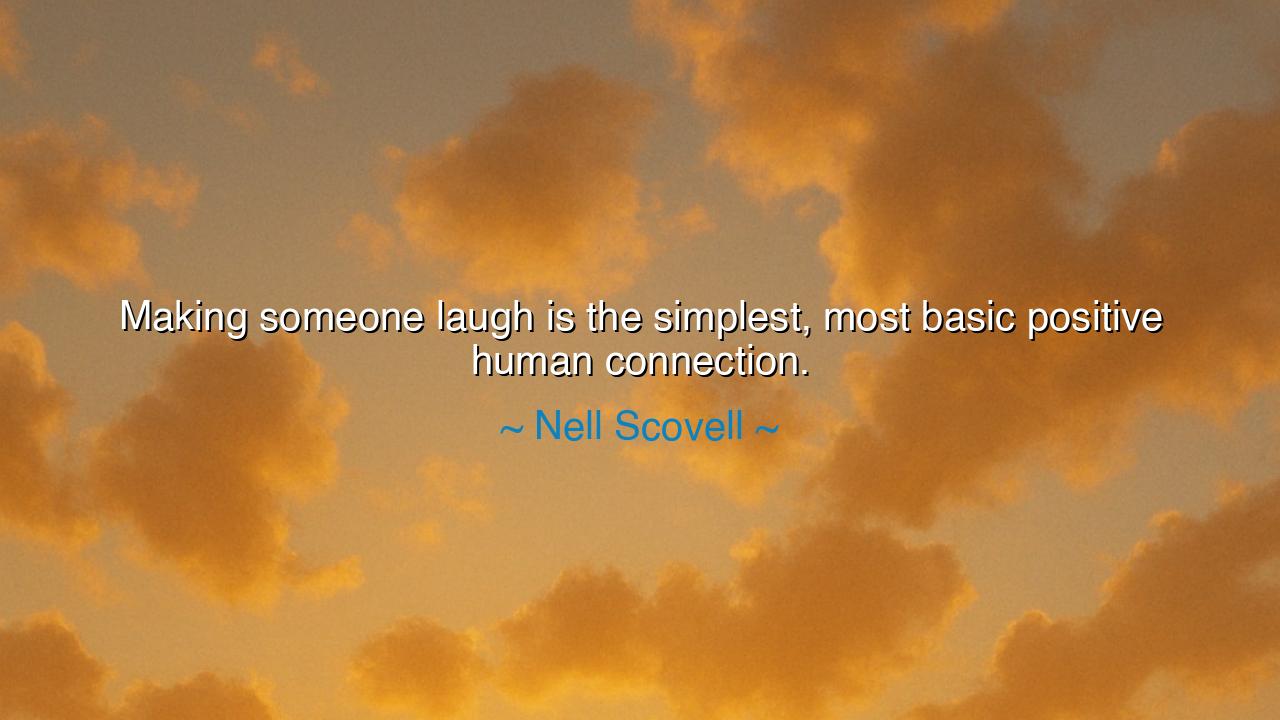
Making someone laugh is the simplest, most basic positive human






Hear the gentle wisdom of Nell Scovell, who proclaimed: “Making someone laugh is the simplest, most basic positive human connection.” This saying, though clothed in simplicity, carries the deep resonance of ancient truth. For laughter is older than speech, older than writing, older even than the monuments of kings. It is the spark of recognition between two souls, the moment when burdens are lightened and hearts are joined. In laughter, enmity softens, distance collapses, and the walls between strangers fall away.
The meaning of her words is that laughter is not merely amusement—it is a bridge. Where long speeches fail, where arguments divide, laughter unites. It is the simplest connection, for it requires no wealth, no title, no grandeur—only the willingness of one spirit to share joy with another. It is the most basic because it springs naturally, unforced, like water from a hidden spring. And it is positive, because true laughter heals, uplifts, and reminds us that, despite our struggles, we share the same human journey.
History offers us examples of this sacred truth. Consider the presidency of Abraham Lincoln, who led his nation through its darkest hour of civil war. Often crushed under the weight of bloodshed and despair, he turned to humor as a weapon of survival and as a balm for those around him. With a story, a joke, or a smile, he lifted the spirits of generals and citizens alike, not to dismiss the gravity of the moment, but to remind them of their shared humanity. His ability to make others laugh was not trivial—it was strength, a force that kept unity alive when the world threatened to fall apart.
The origin of Scovell’s words lies in her own life as a writer and storyteller. In crafting comedy, she learned firsthand the power of humor to pierce through barriers, whether of gender, hierarchy, or power. To her, laughter was not decoration—it was connection, proof that humans crave joy even in their deepest seriousness. By naming laughter as the simplest bond, she placed it on the pedestal of human essentials, alongside bread and water, for the soul hungers for lightness as much as the body hungers for food.
And yet, we must not confuse true laughter with mockery. For there is laughter that builds and laughter that destroys. There is laughter that includes, and laughter that excludes. The laughter of which Scovell speaks is the laughter of connection—the kind that reminds both giver and receiver of their shared dignity. It is the laughter that eases grief, that restores hope, that says, “You are not alone.” To wield laughter rightly is to wield a power both ancient and holy.
The lesson for us is profound: do not underestimate the gift of humor. To make another laugh is to offer them a breath of freedom, even if only for a moment. In households, in workplaces, in public spaces, laughter softens hearts, bridges divides, and brings forth light in darkness. Every person can give this gift; it costs nothing but attention and kindness. In a world heavy with negativity, each shared laugh is an act of quiet rebellion against despair.
So I say unto you: cherish the power of laughter. Make someone laugh not to mock, but to uplift; not to wound, but to heal. Carry humor with you as both shield and torch—shield against bitterness, torch against gloom. For laughter is the music of the soul, and when you cause it to rise in another, you create the most ancient and enduring connection of all. And those who learn to spread such joy will be remembered not only for their words or their deeds, but for the moments when they made another human heart feel light again.






MSMe Soc
Reading this, I feel intrigued by the idea that laughter could be a universal bridge between people. How does humor compare to other positive interactions like helping, listening, or showing kindness? I also wonder if laughter’s role in bonding is stronger in certain age groups or social contexts. It sparks broader questions about the psychology of joy and how small moments of shared amusement can leave lasting impressions.
SCSang cute
I find this perspective charming but also thought-provoking. Does the act of making someone laugh rely on shared values, timing, or mutual understanding? Can attempts at humor ever backfire and create disconnection instead? It prompts reflection on how humans navigate social interactions and use joy, playfulness, and vulnerability to form meaningful connections beyond superficial exchanges.
QPquynh phan
This quote highlights the power of positive emotion in creating bonds. I wonder if there’s research supporting the idea that laughter is the most basic connection, or if other gestures, like shared touch or eye contact, are equally fundamental. It also makes me consider whether the intent behind humor—whether to genuinely uplift or to manipulate—affects the authenticity of the connection formed.
PTPhat Tan
Reading this, I feel uplifted by the simplicity of human connection through laughter. I’m curious whether Scovell views humor as more impactful in personal relationships or in professional and public settings. Can a well-timed joke or playful moment influence trust, collaboration, or empathy in ways that words alone cannot? It sparks thought about how laughter might serve as a fundamental social glue in communities and relationships.
DDnong duc duy
This statement feels deeply relatable because laughter often creates instant rapport. I wonder why humor is such a universal connector—does it release tension, signal shared understanding, or simply bring joy? It also makes me reflect on how people use humor differently across cultures and personalities. Can making someone laugh truly deepen a bond, or is it just a temporary connection that requires other factors to maintain?